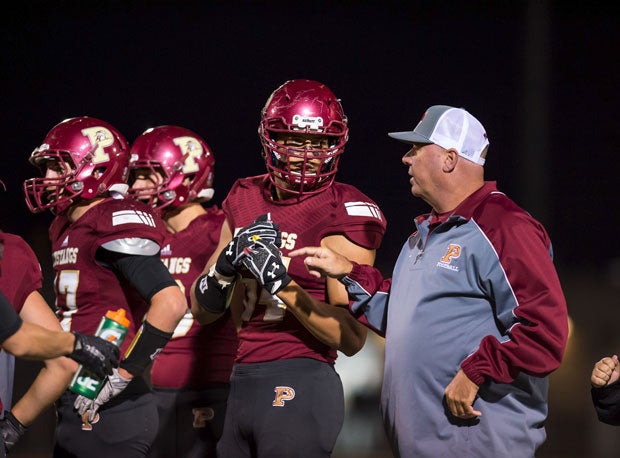Openness, honesty, involvement are keys to getting student-athletes going on recruiting process.
Video: Wyatt Davis ultimate highlights
When it comes to recruiting it's obvious when an athlete is a D1 talent.
This is the third part of a 3 part series on college recruiting with Spring High School football coach Chad Johnson in Texas.
Read the first two parts (Building Relationships with College Coaches) here and (The Recruiting Process Timeline - freshman year to Signing Day) here.
How do you go about deciding what level you should try to push a kid to? Or do you leave that up to the college coached?Johnson: I have learned through talking with college coaches about what they are looking for. Each school, each level, D1 to NAIA, has a profile of a kid they are looking for at each position. For example, most D1 schools want offensive linemen to be at least 6-foot-4 or taller. If a kid is shorter than that, he had better be one heckuva player.
First, the athleticism and measurable stats will stand out for the D1 kids. D2 kids will be just a small step below the D1 kids in the measurable - maybe just not quite as tall or not quite as fast. However, they're still very athletic and very good football players. The D3 and NAIA kids are very good high school football players that are also very good students. They most often are not a star player on the team but they are starters and contribute a lot to the team.
Ultimately, the power 5 D1 kids are no-brainers. They easily stand out in size, athleticism and ability. If I know a kid isn't a power 5 kid, but he is a star player for us, I start by pushing him to the Group of 5 schools as well as D2 and on down the line. Feedback I get from those group of five coaches lets me know if I was right or if the kid is definitely a D2 kid. Really good players that are not stars for us, I start by talking to D2 schools about them, if no one bites, and they have grades, then I make sure they are promoted to the D3 and NAIA schools.
Lastly, I will say this, if a kid can start for us as a sophomore, he has a very good chance of playing college football at some level two years down the line. That is kind of my starting point for starting to push and get those kids on the college coaches' radars.

Robust and honest discussions with student-athletes about recruiting are essential to get an athlete to play at the next level.
Photo by Matt Daniels
We conduct large group meetings with the kids when I go over the recruiting process from start to finish. We start by explaining that each school, each coach has a template of what they are looking for at every position. If you do not "fit" the mold they are looking for, (i.e. height) unless you are a freak, they are not going to recruit you. It is a harsh reality, but I believe in being brutally honest.
I show the kids a blank prospect sheet that I give to every college coach and email to every college in the country whether they have recruited us or not. I want the kids to be aware of what information I am passing along to college coaches. I explain how to set up their highlight video, no more than 15 clips, put your very best 5 to 10 plays first.
I have an advice sheet for every position on what constitutes a highlight, what college coaches are looking for on their highlight film. We discuss registering with the NCAA clearinghouse as well as getting signed up for the SAT and ACT exams. We cover core GPA and the NCAA sliding scale so they understand the importance of academics. I tell the kids, if you want to go to college, it does not matter if you play football or not, making anything less than a B semester grade in any class is unacceptable.
I also cover attending college camps, what to expect, which ones the athlete should attend etc. I go over social media use: What is acceptable or unacceptable, retweeting something is an endorsement, etc.
What role do parents play at your school in the recruiting process?Parents play a vital role in the recruiting process in my opinion. At Spring, we try to involve the parents as much as possible. Starting with a recruiting workshop to educate both the athletes as well as the parents as to how the recruiting process works from start to finish. Essentially all the things discussed as my answer to question
In addition, I have had sit down, one-on-one meetings with parents to discuss any specific questions as it relates to their son.
Chris Fore is a veteran Head Football Coach and Athletic Director from Southern California. He consults coaches and programs nationwide through his business Eight Laces Consulting.